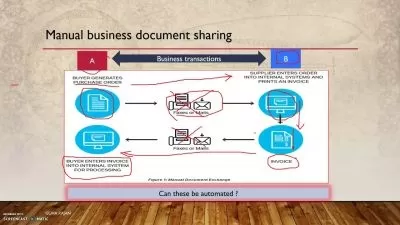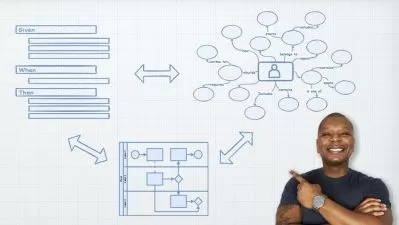About Business AnalysisLearn More
A business analyst works to determine areas of a company where they can modify processes to run more efficiently. They analyze data pertinent to operations, finance, and distribution of an organization to identify business improvement elements. Business analysts often work with others in a company to find solutions to make the necessary modifications. Udemy offers business analyst training to teach you what you need to know.
Sort by:
Sorting
The newest
Most visited
Course time
Subtitle
Filtering
Courses
Subtitle

Linkedin Learning


Michael de la Maza and Madecraft
Business Lessons from a Chess Champion 20:56
English subtitles
08/31/2024
Subtitle

Linkedin Learning


Leslie Crutchfield
Business Leadership, Social Change, and Movements 1:07:39
English subtitles
08/31/2024
Subtitle

Linkedin Learning


Jamie Champagne
Business Analysis: Essential Tools and Techniques 48:03
English subtitles
08/31/2024
Subtitle

Linkedin Learning


Vincent Mirabelli
Leveraging Business Analysis in ESG 38:17
English subtitles
06/18/2024
Subtitle

SkillShareBasics of Electronic Data Interchange (EDI) in Business
1:36:17
English subtitles
02/05/2024
Books
Frequently asked questions about Business Analysis
Business analysis involves examining how a business operates, its customers, key stakeholders, marketing strategies, and production techniques to come up with ways to help the business improve. A business analyst gathers information about the company, including its central philosophies and driving principles, and determines how they help it reach its goals. The degree to which the business’s operation and core principles help it meet its objectives determines the organization's efficiency. A business analyst then recommends ways to make the company and its employees more productive. To accomplish this, an analyst presents technical solutions to business problems. The analyst may also suggest ways to enhance sales revenue or meet other objectives central to the business’ success.
Business analysts often alter their approach based on the nature of the business or the problem they are trying to solve. For example, they may use S.W.O.T. analysis, which stands for four things the analyst will study: the business's strengths, weaknesses, opportunities, and threats. An analyst may also use M.O.S.T. analysis, which highlights four things the analyst helps the company ascertain: its mission, objectives, strategies, and tactics. When it comes to looking at the external factors impacting a business, PESTLE may be the best strategy. This method examines the political, economic, social, technological, legal, and environmental factors affecting the business. To find novel ways of enhancing efficiency and production, an analyst can also engage in system analysis, which involves taking an in-depth look at the weaknesses, problems, or failures of the business's current system and finding solutions.
Business analysts solve problems that rely on analytical thinking, as well as problem-solving skills. To be successful in this role, you'll have to be comfortable acting as a consultant to facilitate solutions to those problems. Strong communication skills — both oral and written — will help you communicate your ideas and connect with clients on an interpersonal level. Business analysts are also in charge of executing plans, so being detail-oriented and organized are great traits to have to keep you and your team on track. Due to the financial nature of the role, you'll also need to know accounting basics and how to perform cost analyses. Working knowledge of computer technology and how it interfaces with networks and databases is also a requirement.
Business analysis is a core part of jobs found at various business management levels, human resources, and marketing. Furthermore, a business analyst can get a job within their specific discipline, such as an IT business analyst, business analyst manager, data analysis scientist, quantitative analyst, or a start-up business coach. Several jobs for a business analyst involve analyzing data. The ability to gather, organize, and analyze data adds significant value to a business analyst’s prospects. This involves data such as location-specific sales data, internet browsing activity as it pertains to consumer buying trends, and data from marketing campaigns. Additionally, many business consulting jobs require business analytical skills. Companies that hire consultants to fix issues with their marketing, financing decisions, optimizing their human resources, or even product design could all provide jobs for a business analyst.
A business analyst typically doesn’t need to learn programming languages to perform their duties. In most situations, the company they are analyzing will either hire someone or have someone on staff to program in solutions the business analyst recommends. However, knowing the limits of what’s possible with programming is helpful. An analyst only needs to make recommendations that are feasible for the business they are helping. While the analyst doesn’t have to know how to code, presenting only actionable solutions will save the organization time and money. An intro Udemy course is an easy way to learn what certain programming languages can and can’t do and how to use application programming interfaces (APIs) when a programming language falls short in providing solutions.
Business analysts use Microsoft Excel, which allows them to organize figures, charts, and ideas in a manageable and presentable fashion for their clients. An analyst also uses Microsoft PowerPoint, or a similar presentation application, to present their ideas in an easy-to-digest format that they can share with all stakeholders. An analyst may also use SQL, which enables them to communicate with databases. This is often needed because many databases are written in SQL, and to extract pertinent information, the analyst needs to be able to interface with the database. An analyst may also use Google Analytics, which enables them to pinpoint strengths and weaknesses in an online marketing strategy. Google Analytics can also be used to recommend actionable solutions to optimize a business’ online presence.
The International Institute of Business Analysis (IIBA) is a not-for-profit association formed to promote and support business analysis. IIBA certification helps business analysts gain the expertise they need to land better jobs and earn higher pay. The IIBA offers the Entry Certificate in Business Analysis (ECBA), Certification of Capability in Business Analysis (CCBA), and the Certified Business Analysis Professional (CBAP) designation. Each certification entails progressively more qualifications and knowledge. Therefore, the ECBA and CCBA lay a foundation for a business analyst working to earn a CBAP. There are also exams involved with each certification that test a candidate’s knowledge of different concepts connected with business analysis.


























